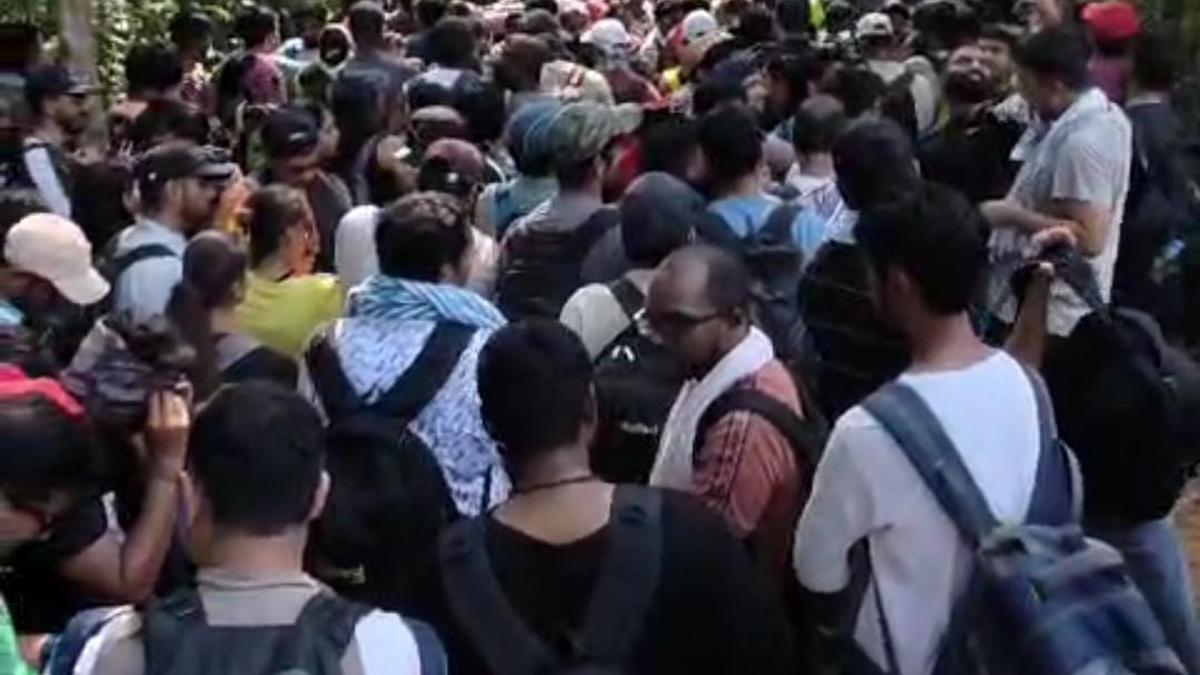
Karnataka’s troubled trekking trails
The Hindu
Overcrowding and environmental concerns lead to a temporary ban on trekking in Karnataka's Kumara Parvatha and other paths.
On Republic Day, 954 trekkers who had tickets and over a thousand more who had shown up with the hope of getting tickets had gathered near the entry point of Kumara Parvatha. The fourth highest peak in Karnataka, at a height of 1,700 metres, it is situated in the ecologically fragile Pushpagiri Wildlife Sanctuary, whose entry point is in the Dakshina Kannada district in the Western Ghats. Videos of the overcrowding went viral; so did complaints of plastic bags, bottles, and leftover food that littered the forest.
The alarming number of people raised concerns about the threat posed by unregulated trekking across the State. With environmentalists raising concerns, the Environment Minister of Karnataka, Eshwar Khandre, imposed a temporary ban on trekking in Kumara Parvatha and other trekking paths in the State. He said they would be opened only after a standard operating procedure (SOP) is put in place.
Kumara Parvatha is managed by the Madikeri divisionof the Forest Department, with other trails like Kuduremukh being managed by their respective divisions. However the bulk of the trails — 23 trekking spots — fall under the Karnataka Ecotourism Development Board (KEDB), a wing of the Forest Department. As many as 1,13,243 people visited these between April and December 2023, bringing in a revenue of ₹3.73 crore. This is a significant increase from the entire previous financial year of April 2022 to March 2023, when there were 96,796 visitors (₹2.88 crore revenue). In 2021-22, when COVID-19 regulations were in place, 61,023 trekkers scaled the hills (₹1.45 crore).
Skandagiri in Chickballapur district, around 60 kilometres from Bengaluru, was the most popular trekking stretch with 45,018 visitors in 2023, bringing in ₹1.72 crore. This was followed by Makalidurga in Bengaluru Rural district, which had 15,454 visitors; Antharagange in Kolar district, which had 13,272 visitors; and Savandurga in Ramanagara district, with 8,069 visitors.
Trekking paths must be booked online beforehand, and each has a limited number of slots per day (100 to 350). The online government portal — Karnatakaecotourism.com — is supposed to provide trekkers with guide services and first aid. However, regular trekkers have noticed that, except in a few places, on-ground regulation is poor.
“Except for Skandagiri and Makalidurga, forest guards are not available anywhere else even to check the head count. In the absence of guides, it is easy to get lost at some of these treks,” said Satyananda. M, a regular trekker who has covered most trails maintained by the KEDB. He adds that at the top of many hills, vendors sell soft drinks and instant noodles, and there is no waste management system. “If visitors are being charged for going down these trails, there must be regulation and accountability,” he said. Most regular trekkers praise the Kuduremukha National Park for its well-regulated, well-organised treks to three peaks in the area.
Officials are aware of the lax maintenance of rules at many trails. Kumar Pushkar, the Chief Executive Officer of KEDB, said guards on some trails were not as diligent, and there was scope for improvement. He also said the KEDB was actively trying to bring about stricter vigilance at all trekking points. Citing one such example, he said, “At Savandurga, I have now asked the Deputy Conservator of Forest (DCF) to completely fence the area and ensure that there is only one entry point to stop illegal entries. A guard will be posted to check the tickets.”













